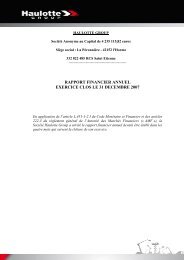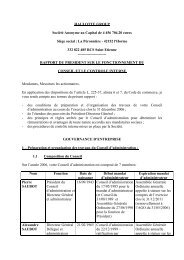2007 - Pinguely Haulotte
2007 - Pinguely Haulotte
2007 - Pinguely Haulotte
You also want an ePaper? Increase the reach of your titles
YUMPU automatically turns print PDFs into web optimized ePapers that Google loves.
Excerpt of the management report to the annual general meeting<br />
of April 22nd, 2008<br />
Rules concerning the appointment and<br />
replacement of directors<br />
By law a director may be a natural person or legal entity.<br />
Appointment of directors:<br />
Each director must possess legal capacity or be an emancipated<br />
minor and shall not be subject to incompatibilities or restrictions<br />
provided for under law.<br />
The director may be a salaried employee of the company if his<br />
or her employment contract predates the appointment to the<br />
board and corresponds to an actual employment.<br />
The number of directors bound by employment contracts with<br />
the company may not exceed one third the total members on<br />
the board.<br />
In the absence of an age limits set by the bylaws for directors,<br />
not more than one third of the board members may exceed<br />
seventy years of age.<br />
Appointments of directors during the life of the company fall<br />
under the authority of the ordinary general meeting and shall<br />
be recorded in the agenda of the meeting except for cases of<br />
appointments following revocation.<br />
Directors are appointed for a maximum term of six years (article<br />
12 of the bylaws).<br />
The Board of Directors selects from among its members a natural<br />
person as Chairman that must be less than seventy years of age.<br />
The Chairman is appointed for a term which may not exceed<br />
his or her term as director and may be reappointed (article 12<br />
of the bylaws).<br />
Directors may be reappointed and no provisions of the bylaws<br />
provide for the contrary.<br />
The bylaws shall not set a minimum number of directors that<br />
exceeds the legal minimum.<br />
Replacement of directors:<br />
When during his or her term the Chairman of the Board of<br />
Directors reaches seventy, he or she shall be considered to have<br />
automatically resigned and will proceed with the appointment<br />
of a new chairman in accordance with the provisions of the<br />
bylaws (article 12 of the bylaws).<br />
In the event of vacancies of board directorships pursuant to<br />
death or resignation, Board members may appoint themselves,<br />
on an interim basis by cooptation, a new director whose<br />
appointment must be approved by the next shareholders'<br />
meeting. Cooptation is not possible when the number of directors<br />
is less than the legal minimum of three. In the latter case the<br />
ordinary general meeting must be immediately called to complete<br />
the number of board members.<br />
In compliance with the provisions of the law, terms of directors<br />
expire pursuant rules governing age limits, the occurrence of<br />
events preventing the director from exercising his or her functions<br />
(death, illness, etc.), the winding up or transformation of the<br />
company, adoption of a new system of corporate governance<br />
(dual system with a executive board and supervisory board) and<br />
finally by revocation or resignation.<br />
Rules governing the modification of the company's<br />
bylaws<br />
Amendments to the bylaws of the company in accordance with<br />
legal provisions are subject to the exclusive authority of the<br />
extraordinary general meeting.<br />
As an exception to this rule, the Board of Directors may modify<br />
the bylaws in respect to amounts of share capital and the number<br />
of shares comprising the capital, after recording, in its first meeting<br />
following the end of the fiscal year, the number and amount of<br />
shares issued pursuant to the exercise of stock options.<br />
In this context, the Board of Directors may also delegate authority<br />
to its Chairman to amend the bylaws and comply with legal<br />
formalities if it decides that it is preferable to not wait for the end<br />
of the fiscal year to proceed with these modifications.<br />
Powers of the Board of Directors concerning notably<br />
issuing or repurchasing shares<br />
The powers of the Board of Directors concerning share buy-back<br />
programs are authorized and delegated by ordinary and<br />
extraordinary general meetings.<br />
The ordinary general meeting authorizes the Board of Directors,<br />
with the possibility to delegate said authority to its chairman to<br />
purchase shares of the company on or off market by any means<br />
representing not more than 10% of the company's capital stock<br />
(and subject to a maximum of 5% of the share capital for the<br />
purpose of acquiring shares for subsequent use as a means of<br />
payment or exchange in connection with mergers, demergers<br />
or contributions). This authorization is granted for a maximum<br />
of eighteen (18) months and may also be used during takeover<br />
bids or tender offers.<br />
The ordinary general meeting confers full powers to the Board<br />
of Directors with the possibility to further delegate this authority<br />
to the Chairman, to place all stock market orders, use any derivative<br />
instruments in compliance with applicable securities market<br />
regulations, conclude all agreements for the purpose of<br />
completing formalities, procedures and filings, and in general<br />
take all measures considered necessary.<br />
ENGLISH

















